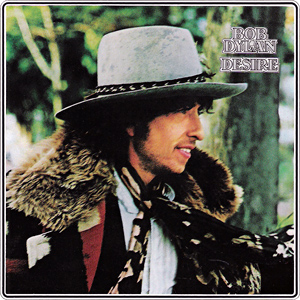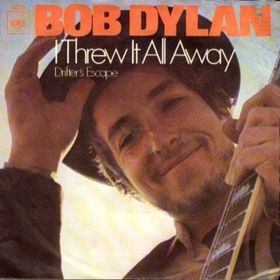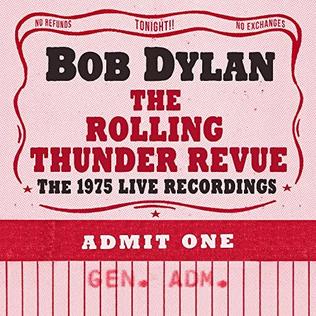
Desire is the seventeenth studio album by American singer-songwriter Bob Dylan, released on January 5, 1976, through Columbia Records. It is one of Dylan's most collaborative efforts, featuring the same caravan of musicians as the acclaimed Rolling Thunder Revue tours the previous year. Many of the songs also featured backing vocals by Emmylou Harris and Ronee Blakley. Most of the album was co-written by Jacques Levy, and is composed of lengthy story-songs, two of which quickly generated controversy: the 11-minute-long "Joey", which is seen as glorifying the violent gangster "Crazy Joey" Gallo, and "Hurricane", the opening track that tells a passionate account of the murder case against boxer Rubin Carter, who the song asserts was framed. Carter was released in 1985, after a judge overturned his conviction on appeal.

"Tangled Up in Blue" is a song by American singer-songwriter Bob Dylan, which was released as the opening track on his 15th studio album Blood on the Tracks (1975). The song was written by Dylan and produced by David Zimmerman, Dylan's brother. Released as a single, it reached No. 31 on the Billboard Hot 100. The song concerns relationships and contains different narrative perspectives. Dylan has altered the lyrics in subsequent performances, changing the point of view and details in the song.

The Rolling Thunder Revue was a 1975–76 concert tour by American singer-songwriter Bob Dylan with numerous musicians and collaborators. The purpose of the tour was to allow Dylan, who had now become a major recording artist and concert performer, to play in smaller auditoriums in less populated cities where he could be more intimate with his audiences.

The Bootleg Series Vol. 5: Bob Dylan Live 1975, The Rolling Thunder Revue is a live album by Bob Dylan released by Columbia Records in 2002. The third installment in the ongoing Bob Dylan Bootleg Series on Legacy Records, it documents the Rolling Thunder Revue led by Dylan prior to the release of the album Desire. Until the release of this album, the only official live documentation of the Rolling Thunder Revue was Hard Rain, recorded during the less critically well received second leg of the tour.
"Shelter from the Storm" is a song by Bob Dylan, recorded on September 17, 1974, and released on his 15th studio album, Blood on the Tracks, in 1975. It was later anthologized on the compilation album The Essential Bob Dylan in 2000.
"With God on Our Side" is a song by Bob Dylan, released as the third track on his 1964 album The Times They Are A-Changin'. Dylan first performed the song during his debut at The Town Hall in New York City on April 12, 1963.
"I Shall Be Released" is a 1967 song written by Bob Dylan.

"Gotta Serve Somebody" is a song written and performed by American singer-songwriter Bob Dylan, released as the opening track on his 1979 studio album Slow Train Coming. It won the Grammy Award for Best Rock Vocal Performance by a Male in 1980. It was later anthologized on the compilation albums Biograph (1985), Bob Dylan's Greatest Hits Volume 3 (1994), The Essential Bob Dylan (2000), The Best of Bob Dylan and Dylan (2007).
"Simple Twist of Fate", a song by American singer-songwriter Bob Dylan, was recorded on September 19, 1974, and was released in 1975 as the second song on his 15th studio album Blood on the Tracks.
"If You See Her, Say Hello" is a song by American singer-songwriter Bob Dylan from his 15th studio album, Blood on the Tracks (1975). The song is one of five on the album that Dylan initially recorded in New York City in September 1974 and then re-recorded in Minneapolis. The later recording, made on December 30, 1974, was produced by Dylan's brother David Zimmerman, who was not credited. The recording later became the album track and the B-side of the "Tangled Up in Blue" single, released in February 1975.
"It Takes a Lot to Laugh, It Takes a Train to Cry" is a song written by Bob Dylan, that was originally released on his album Highway 61 Revisited. It was recorded on July 29, 1965. The song was also included on an early, European Dylan compilation album entitled Bob Dylan's Greatest Hits 2.
"Tears of Rage" is a song with lyrics written by Bob Dylan and melody by Richard Manuel. Dylan and the Band first recorded the song in 1967, but it was not released until 1975 on The Basement Tapes album. In 1968, the Band recorded it for their debut album Music from Big Pink.
"When I Paint My Masterpiece" is a 1971 song written by Bob Dylan. It was first released by The Band, who recorded the song for their album Cahoots, released on September 15, 1971.

"Tonight I'll Be Staying Here with You" is a song written by Bob Dylan from his 1969 album Nashville Skyline. It was the closing song of the album. The song was the third single released from the album, after "I Threw It All Away" and "Lay Lady Lay", reaching #50 on the US Billboard Hot 100 chart, and reaching the top 20 in other countries. It was anthologized on the compilation albums Bob Dylan's Greatest Hits Vol. II and Playlist: The Very Best of Bob Dylan '60s.

"I Threw It All Away" is a song by American singer-songwriter Bob Dylan. The track appeared on Dylan's album Nashville Skyline in 1969, and was released as its first single later that year, where it reached number 85 on the Billboard Hot 100, and number 30 on the UK Singles Chart. It is considered to be one of the best and most popular songs on the album.
"To Be Alone with You" is a country-rock song by American singer-songwriter Bob Dylan, released as the third track on his 1969 album Nashville Skyline.
"Romance in Durango" is the seventh song on Bob Dylan's 1976 album Desire. It was written by Dylan and Jacques Levy, who collaborated with Dylan on most of the songs on the album. The chorus contains several lines sung in Spanish, resulting in the song being released as a single in Spain in 1977. It was also released as a b-side to the Japanese single of "One More Cup of Coffee" in 1976. The song was produced by Don DeVito.
"You're Gonna Make Me Lonesome When You Go" is a song by Bob Dylan. Recorded in September 1974, it appeared as the fifth track on Dylan's album Blood on the Tracks, released in January 1975.
"Sara" is a song from Bob Dylan's 1976 album Desire. It is the closing song on the album. Unlike many of the songs on the album, which were written by Dylan and Jacques Levy, "Sara" was written solely by Dylan, as an autobiographical account of his estrangement from then-wife Sara Dylan. It was recorded on July 31, 1975.

Bob Dylan – The Rolling Thunder Revue: The 1975 Live Recordings is a box set of 1975 live recordings by Bob Dylan, released on June 7, 2019. For this tour, Dylan assembled a loose collective of a backing band called Guam and played across North America for several dozen shows. The tie-in Netflix documentary film Rolling Thunder Revue: A Bob Dylan Story by Martin Scorsese was released the following week. A similar compilation was released in 2002 entitled Bob Dylan Live 1975, The Rolling Thunder Revue, as part of Dylan's ongoing Bootleg Series. That compilation was re-released on vinyl as a companion to the later release.








